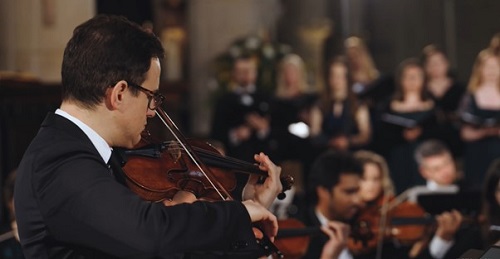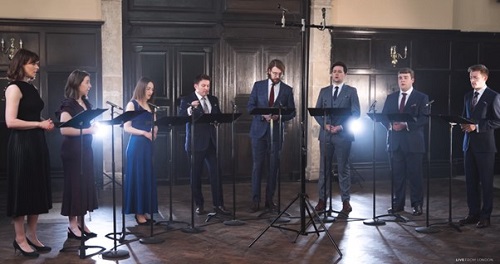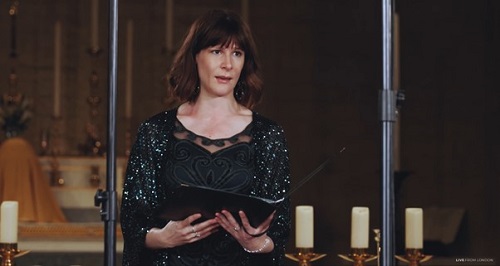VOCES8’s LIVE From London Summer 2023 festival feels a bit mis-named – but that’s only because the nine concerts which form this summer’s online festival, which runs from 12th August to 17th September, span the globe and the centuries. Filmed live in concert, in venues as far apart as Milton Abbey in Dorset, Jeanne Lamon Hall in Toronto and The Pepper Canister Church in Dublin, the programmes offer music drawn from six centuries, with the sacred and secular, the new and the old, familiar favourites and world premieres, nestling side by side. VOCES8 themselves feature in four of the nine concerts, alongside Apollo 5, I Fagiolini (another chance to enjoy their much-loved Au naturel), Tafelmusik and Chamber Choir Ireland, and international soloists including Rachel Podger, Mary Bevan and Davina Clarke.
For this concert, filmed live in May this year at All Hallows Church, Gospel Oak, London, VOCES8 and the VOCES8 Foundation Choir and Orchestra joined forces under the baton of Artistic Director Barnaby Smith ‘To Sing of Love’. That’s the title of a new concerto written for violinist Jack Liebeck and the Foundation Choir and Orchestra by the American composer Taylor Scott Davis.
But, it’s with another world premiere that the concert begins – Davis’s festive Musica Dei, in which viola tremolandos trigger a tumbling pentatonic fanfare from the horn, uplifting energy from the timpani, and a rich, seemingly infinite fount of melody and colour which springs from that horn salutation. Radiant sopranos glory in music, “the gift of the supreme God”, and are answered by the cellos’ excited counter-voice. The latter section is led by the Carducci Quartet’s Emma Denton, Jack Liebeck is in the leader’s seat, Julian Bliss is playing clarinet, Gareth McLearnon flute – Smith has a luxury instrumental team at his disposal. For all the celebratory cymbal clashes and golden orchestral sheen, though, there is a knotty tension in the heart of the work – music both calms savage souls and “draws men, draws gods” – and Smith exploits this, rhythmically and harmonically, a timpani pedal ratcheting up the temperature, the full-voiced ensemble exploding with joy at the close. It’s an incredibly stirring four-minute opener.

The programme includes other works by Taylor Scott Davis. The a cappella 8-voice motet, Stardust, that he wrote for VOCES8, and which is a perennial favourite, has been orchestrated for this LIVE from London performance: it’s sonically luxurious and if rather sentimentally indulgent, then who would complain, so wonderfully does it conveys the mystery and marvel expressed by Clairel Estevez’s poem: “A love like ours / Sincere and pure / Deserves to be guided by Angels / Deep, into the unknown.”
And, guest leader Jack Liebeck gives the world premiere performance of the new concerto for violin, choir and orchestra, To Sing of Love: a Triptych, which gives the concert it’s title. The work begins with a Prelude – darkly intense strings, bright flecks from the flute and oboe, melodically rich, harmonies that churn down deep – which prefaces three movements: ‘Effortlessly’, ‘Perilously’ and ‘Generously’ – the first developing an early setting by Davis of a 13th-century text, the latter two setting newly commissioned texts designed to complement the earlier poem. Liebeck’s tone is silvery silk, and incredibly focused; and, as always, the VOCES8 production team do their stuff superbly. It’s in ‘Perilously’ – nervous, foreboding, restless, but always songful – that the violin seems really set free from the vocal textures. But, one feels that Davis’s natural accent is a vocal one, and that he’s repeatedly drawn back to favourite motifs and melodies. It’s the vocal gestures – the sumptuousness velvetiness of the textures, the propelling nature of the counterpoint, the contrasts of light and darkness, the prevailing exultancy – that really draw the listener’s attention. Though, to my ears at least, there does seem to be a surfeit of sentiment: less sugar can, perhaps, be more spiritual.

Perhaps the most intriguing work on the programme is I Stand in the Library by Edward Newton-Rex, which sets text generated by AI. In a pre-concert interview, Newton-Rex talks with Barnaby Smith and VOCES8 bass Christopher Moore about his work in this field, and how he began thinking in 2010 about “what it would take to teach a computer system to compose music” – acknowledging, with a wry grin, that many people will wonder, “Why?” Newton-Rex discusses his excitement about the way AI might “open up amazing new interfaces and possibilities … that people could interact with AI music counterparts – where you could improvise along with a computer, where you could personalise music”.
If this all sounds a bit like a composer signing their own redundancy notice, then Newton-Rex is convincing when he talks about the way collaborating with AI systems can be creatively inspiring and how, in composing I Stand in the Library, “the AI system led me in a totally different direction to where I would have gone otherwise”. It helps him, when he sits down at the piano, to “escape playing the same chords, over and over again”: “it’s like interacting with another musician, being sat at the piano with somebody else”. Inputting a single sentence, “below is a poem about music and solitude”, into a text-generation system led, after some rejection and revision, to a seven-stanza poem which Newton-Rex says reminded him of the poem by Christopher Smart which Benjamin Britten set in Rejoice in the Lamb (I’m not sure I can see the connection!). And, in turn, when he sat down to set this AI-generated text, he was inspired by Britten’s work – on a structural level, for example, in terms of how to separate the stanzas, where to insert the solos. One of the central ideas that the system generated was the poet-speaker’s recollection of hearing the sound of a piano when they were a child, and this encouraged Newton-Rex to set the text for choir and piano.

I Stand in the Library is contemplative and quietening. A Schumann-esque, third-based piano cascade curls down the keyboard, delicately articulated by Alisdair Hogarth, curving through the euphonous vocal clusters. This opening gesture generates the hypnotising ostinati – aural recurrences of that childhood memory – upon which the 15-minute piece is built. The vocal texture is predominantly homophonic, the phrases carefully enunciated by VOCES8 with a characteristically even blend and pure tone: “I stand in the library, where a voice soars”. Alongside the stillness, there is a spirit of elation, as the soprano line brightens and rises, “I was too young to understand the meaning of the words I was singing, yet the sound of the music was in me”. Hogarth makes fragmentary flights to the depths and heights, around a four-note piano ostinato; solo voices float above its windings. Piano and voices are equal protagonists. A more turbulent episode accompanies solos sung with searching intensity by tenor Euan Williamson and soprano Molly Noon.
The AI-generated text is not going to win any literary prizes, and at times dips into banality: “As I was borne along by the music, a solitary tear ran down my cheek, I did not understand why I was crying, I did not know that the voice I heard was my own.” But, it has inspired Newton-Rex to create a probing dialogue for the piano and voices, the harmonies explorative – and sung with brilliant concentration by VOCES8 – and their resolution consoling.

Chris Moore, discussing Christopher Smart’s eccentric devotional poem of praise, Jubilate Agno, from which the text of Britten’s festival cantata Rejoice in the Lamb (1943) is assembled, describes the poem as having a dark kernel – a misunderstood man, suffering from mental anguish – but also expressing joy at the profuseness of the world, in which everything, the cat, the mouse, even the letters of the alphabet, glorify God, simply by existing. It is this profusion of joys – in Smith’s words, the poem’s “technicolour” – that encourages VOCES8 to perform the orchestral version of Britten’s cantata, as arranged by Imogen Holst for the 1952 Aldeburgh Festival. And, this performance entirely communicates the “innocence” and “childish glee” of Britten’s setting, swelling exultantly with jubilant praise, reflecting poignantly on the world’s mysteries, celebrating the beauty of all God’s creation.
The monotone of the opening hymn swells with amazing power, the chant-like unison fuelled by its own intensity and sprinkled with driving woodwind flutters. The procession of praise that follows is incredibly nimble and precise – percussive, kaleidoscopic, festal – and Smith’s handling of the endless metrical changes is slick and commanding. Andrea Haines sings the treble solo which reflects on the daily perambulations of Smart’s cat, Jeoffry, with utmost poise, spotless intonation and cleanness of tone. There is such tenderness here, but it’s complemented by Julian Bliss’s feline wriggles, all mischievous trills and sinuous slipperiness.
Alto soloist Katie Jeffries-Harris introduces an antithetical pride, bombastically relishing the way that the tiny mouse – a “creature of great personal valour” – defends its mate against the “prodigiously” large cat. Jeffries-Harris’s theatrical response to the text, and the immediacy of her delivery, are superb. Blake Morgan’s gentle tenor is the perfect medium, set against reedy woodwinds’ meandering waves, through which to reflect on the blessings bestowed by the flowers. Oboist Ilid Jones deepens the choric anguish as Smart reflects, “For I am under the same accusation with my Saviour”. Smith sculpts this section vividly, bringing forth its almost operatic thrust and underlying menace. It falls to Chris Moore to sing the hymn of ‘Mystic Praise’, and he communicates the strangeness of Smart’s personification of the alphabet, “For H is a spirit and therefore he is God”, with dignity, though it is pushed aside by the full choir’s unison exuberance, which is in turn replaced by a vocal balm.
The programme concludes with Rebecca Dale’s The Cloths of Heaven (2020), originally for SATB, piano and cello, and presented here as orchestrated by Iain Farrington. Oscillating harp, eloquent cello and dulcet clarinet introduce the female voices’ sweet melody, before the opening up of those vocal vistas that VOCES8 sculpt so persuasively. I am taken back to the beginning, and the sentiments of Musica Dei: “Music, the gift of the supreme God, draws men, draws gods; music makes savage souls gentle and uplifts sad minds; music moves the trees themselves and wild beasts, affording solace to all.”
VOCES8’s LIVE From London Summer 2023 festival runs from 12th August to 17th September.
Claire Seymour
Jack Liebeck (violin), Alisdair Hogarth (piano), VOCES8, VOCES8 Foundation Choir & Orchestra, Barnaby Smith (conductor)
Taylor Scott Davis (b. 1980) – Musica Dei (world premiere); Edward Newton-Rex (b. 1987) – I Stand in the Library (world premiere); Benjamin Britten, orch. Imogen Holst – Rejoice in the Lamb; Taylor Scott Davis –Stardust, To Sing of Love: A Triptych (world premiere); Rebecca Dale (b. 1985), orch. Iain Farrington – The Cloths of Heaven
All Hallows Church, Gospel Oak, London; filmed in May 2023, broadcast 12th August 2023.